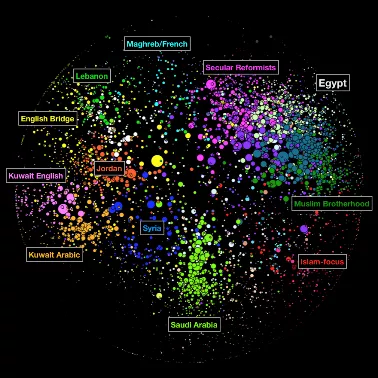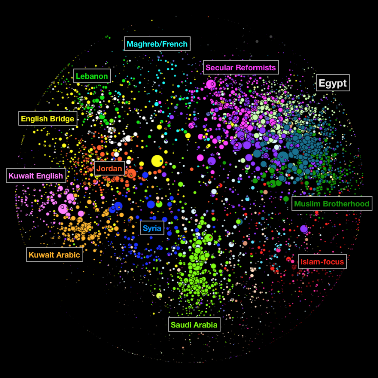
Mapping the Arabic Blogosphere: Politics, Culture and Dissent
December 21, 2010 Update: An adapted version of this paper, which focuses on the political aspects of the Arabic blogosphere and its role in the networked public sphere, appears in the December 2010 issue of New Media & Society. You can download a PDF of the adapted version here.
This case study is part of a series of studies produced by the Internet & Democracy project. The project’s initial case studies investigated three frequently cited examples of the Internet’s influence on democracy. The first case looked at the user-generated news site OhmyNews and its impact on the 2002 elections in South Korea. The second documented the role of technology in Ukraine’s Orange Revolution. The third analyzed the network composition and content of the Iranian blogosphere. Fall 2008 saw the release of a new series of case studies, which broadened the scope of our research and examined some less well-known parts of the research landscape. In a pair of studies, we reviewed the role of networked technologies in the 2007 civic crises of Burma's Saffron Revolution and Kenya’s post-election turmoil. In April 2009, Urs Gasser's three-part case study examined the role of technology in Switzerland’s semi-direct democracy. This case expands on our study of foreign blogospheres with an analysis of the Arabic language blogosphere.
KEY FINDINGS
We conducted a study of the Arabic language blogosphere using link analysis, term frequency analysis, and human coding of individual blogs. We identified a base network of approximately 35,000 active blogs, created a network map of the 6,000 most connected blogs, and with a team of Arabic speakers hand coded 4,000 blogs. The goal for the study was to produce a baseline assessment of the networked public sphere in the Arab Middle East, and its relationship to a range of emergent issues, including politics, media, religion, culture, and international affairs. A Country-based network (view the full map): The Arabic blogosphere is organized primarily around countries. We found the primary groupings to be: Egyptian (largest, with distinct sub- and associated clusters, e.g., Muslim Brotherhood bloggers, including some women); Saudi Arabian (second largest and focused comparatively more on technology than politics); Kuwaiti (divided into English and Arabic language sub-clusters); Levantine/English Bridge (bloggers in the Levant and Iraq using English and connected to the US and international blogospheres); Syrian; Maghrebi/French Bridge; and Religion-Focused. Demographic results indicate that Arabic bloggers are predominately young and male. The highest proportion of female bloggers is found in the Egyptian youth sub-cluster, while the Syrian and Muslim Brotherhood clusters have the highest concentration of males. Arabic media ecosystem: Bloggers link to Web 2.0 sites like YouTube and Wikipedia (English and Arabic versions) more than other sources of information and news available on the Internet. Al-Jazeera is the top mainstream media source, followed by the BBC and Al-Arabiya. Arabic bloggers tend to prefer more politically oriented YouTube videos over cultural ones. Personal life and local issues are most important: Most bloggers write mainly personal, diary-style observations. But when writing about politics, bloggers tend to focus on issues within their own country, and are more often than not critical of domestic political leaders. Foreign political leaders are discussed less often, but also more in negative than positive terms. Domestic news is more popular than international news among general politics and public life topics. The one political issue that clearly concerns bloggers across the Arab world is Palestine, and in particular the situation in Gaza (Israel’s December 2008/January 2009 military action occurred during the study). Other popular topics include religion (more in personal than political terms) and human rights (more common than criticism of western culture and values). Terrorism and the US are not major topics. When discussing terrorism, Arab bloggers are overwhelmingly critical of terrorists. When the US is discussed, it is nearly always critically.
Download PDF for the full Key Findings and paper.
You might also like
- communityRewiring Democracy Now




